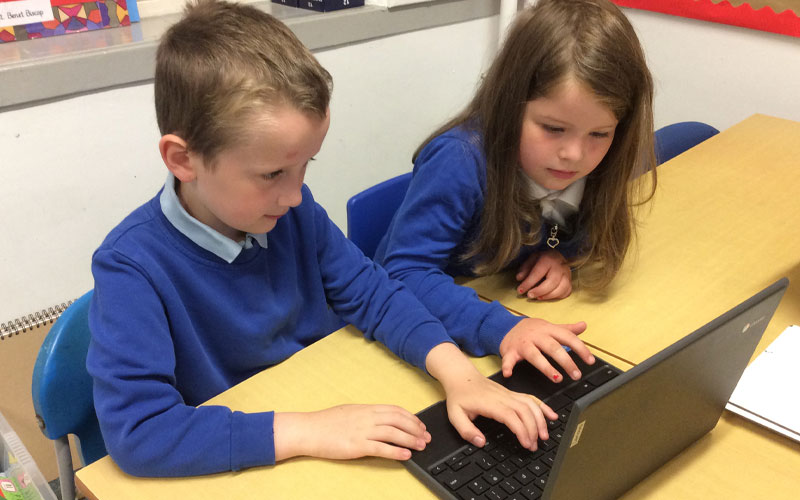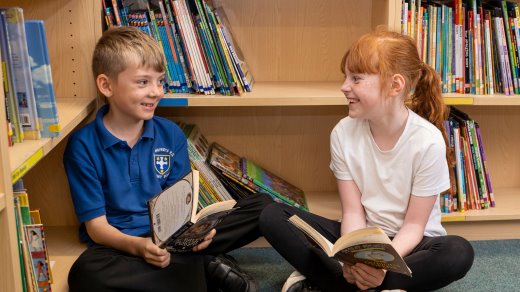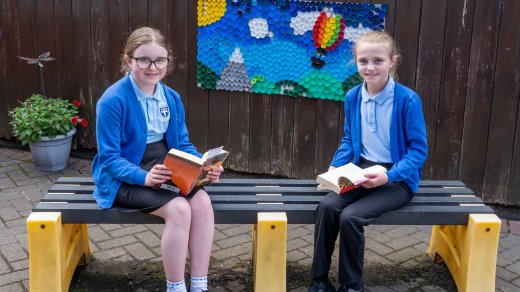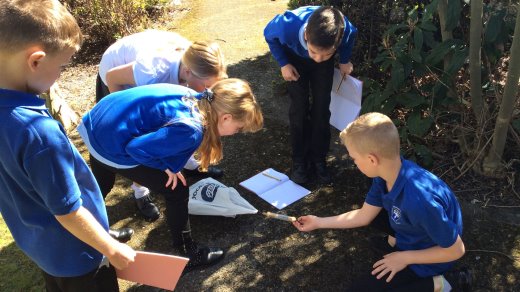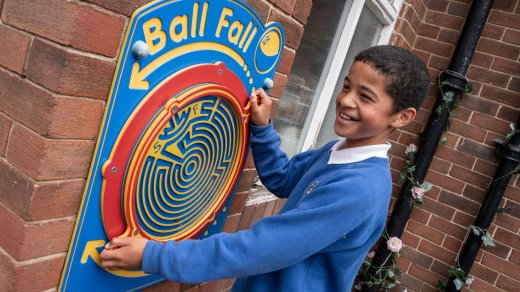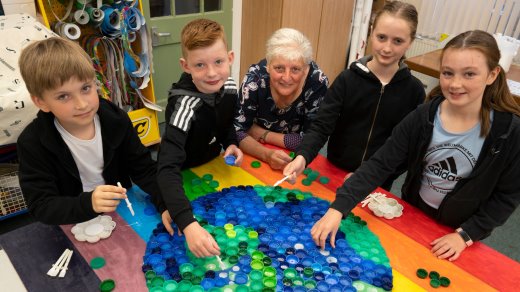00 - 01
Computing
Computing
Computing Lead: Mrs L.Franklin BSc.ed (hons) NPQSL,NPQH
See our Computing Curriculum here!
Intent
Our vision at St.Wilfrid’s Catholic Primary School is that all pupils should enjoy Computing and become confident, passionate and responsible users of technology both inside and outside of school. Through interesting, relevant and inclusive lessons, they will be able to leave Year 6 with a good understanding of how computers and the Internet work, along with being able to complete tasks on them creatively, independently and reflectively for a range of purposes and audiences.
The Computing curriculum at St.Wilfrid’s Catholic Primary School is designed to enable pupils to embrace and utilise new technologies through the application of essential knowledge, principles and concepts. “Whether you want to uncover the secrets of the universe, or you want to pursue a career in the 21st century, basic computer programming is an essential skill to learn.” Stephen Hawking Theoretical Physicist, Cosmologist and Author.
Pupils must be equipped to operate in a rapidly changing workplace and to be prepared for the career opportunities that will be open to them.
Technology is everywhere and will play a pivotal part in students' lives, therefore, we want to model and educate our pupils on how to use technology positively, responsibly and safely. We want our pupils to be creators not just consumers and our broad curriculum encompassing ‘Computer Science’, ‘Information Technology’ and ‘Online Safety’ reflects this. We want our pupils to understand that there is always a choice with using technology and as a school we utilise technology to model positive use. We recognise that the best prevention for a lot of issues we currently see with technology and social media is through education.
Technology provides accessibility opportunities for our pupils and also allows them to share their learning in creative ways. Our knowledge rich curriculum has to be balanced with the opportunity for pupils to apply their skills creatively, which will in turn help our pupils become proficient computer scientists.
We want our pupils to be fluent with a range of tools to best express their understanding and hope by Upper Key Stage 2, children have the independence and confidence to choose the best tool to fulfil the task and challenge set by teachers.
Implementation
Computing skills are taught explicitly at St.Wilfrid’s Catholic Primary School, with every pupil receiving dedicated Computing lessons throughout each half-term. Each half-term has a focus on either Information Technology or Computer Science (encompassing Coding & Computational Thinking and Computer Science – Theory) with Online Safety lessons also taught using a ‘little and often’ approach during each half-term. The skills acquired are then embedded throughout the curriculum.
Learning is sequenced to build knowledge, skills and vocabulary. Throughout units of work teachers encourage children to make links between past learning and new content. We recognise prior learning and build on it with memorable learning experiences with targeted support where necessary. Each unit meets the needs of the National Curriculum and is broken down to cover every element of each of the three strands of Computing.
Alongside our Computing advisor we have created a comprehensive curriculum to best embed and cover every element of the Computing curriculum. The progression of knowledge and skills statements build year on year to deepen and challenge our learners. We use Purple Mash as the core of our curriculum tied with Project Evolve and activities from both Teach Computing and Barefoot Computing to create a comprehensive curriculum providing full coverage and a variety of skills for our children. Online Safety lessons are mapped to the ‘Education for a Connected World’ framework and some of these activities will be reinforced via PSHE lessons and during assemblies. Purple Mash is a child friendly computing system that mirrors a lot of programmes seen in the ‘real’ word (e.g. font buttons are the same, email formats are the same). By using Purple Mash we are exposing the children to real-word systems but giving them freedom to explore using a child-friendly interface. It is also safe in terms of who and what they can access. We have identified Project Evolve as the best resource to deliver our Online Safety lessons and to cover the requirements of the Education for a Connected World framework. We carefully considered and then picked these different resources, as we believe these best cover and deliver each of the individual strands of Primary Computing. This has helped create a cohesive structure with clear activities that match our progression of skills documents.
Whole class floor books are used to evidence computing work and allow children to reflect on their learning throughout the year. Summative end of unit questions are used to assess children’s retention of key skills taught through the units.
Impact
The impact of our Computing curriculum is that we provide pupils with pupils with a set of skills to embed a lifelong love of learning and that they build on the knowledge and skills from previous learning. We ensure that every child can become a confident user of technology, while being able to use it to accomplish a wide variety of goals, both at home and in school. Children will have a secure and comprehensive knowledge of how technology works in the world around them and will develop their understanding of how to deal with online situations safely. Children will become confident global citizens.
Through the explicit teaching of Computing skills, both the teachers and the pupils assess their learning continuously throughout the lesson. To help children get to a deep level of understanding we use quizzes and knowledge organisers that we return to again and again. This is known as interleaving. The knowledge organisers outline what we want the children to know within each unit.
Special Educational Needs & Computing
How do we ensure all children can access computing lessons?
Although a child may have been identified as having a special educational need, they may not have a special educational need in computing. Effective quality first teaching is the key to enabling all children to participate and develop their historical knowledge and skills. Differentiation within lessons is a vital component to ensure that a balance of support and challenge are achieved for all abilities. This is the same in every subject and differentiation is adjusted as expectations of individual pupils rise through progress.
Challenge and support specific to computing may include:
- Open ended tasks allowing for children to explore as far as comfortable
- First hand and hands on experiences
- Teaching advance and specific vocabulary, which can be pre-taught as required
- Using videos, small group or 1:1 recapping of programmes
- Pupil knowledge organisers
Pupils not secure within a lesson sequence are noted and adjustments made to the differentiation or level of support given. Similarly, added challenge is given if pupils are identified as requiring it. This may be noted by the teacher through questioning or the use of written work. Using an interleaving approach means that pupils continually revisit their learning, gradually building a deeper understanding. The way computing also appears in other subjects allows those skills to be consistently revisited in different contexts.
British Values in Computing
In accordance with the ‘Prevent Duty Guidance’, pupils are taught the value and reasons behind laws for governing and protecting us related to using the Internet for sharing information and communicating with others. This also includes them learning about the responsibilities that this places upon them and the consequences which happen when laws are broken.
Pupils are encouraged to know, understand and exercise their rights and personal freedoms and advised how to exercise these safely through our Online Safety lessons. All members of the school community are regularly reminded of the need treat each other with respect.
At St Wilfrid’s Primary School, we recognise that pupils are living in a rapidly changing world, in which computing is playing an ever-increasing role. We aim, therefore, to equip children with the skills to adapt to new technology and to give them confidence to use ICT and computing skills to further their learning and assist them in everyday life.
Building on this knowledge and understanding, pupils are equipped to use information technology to create programs, systems and a range of content. Computing also ensures that pupils become digitally literate – able to use, and express themselves and develop their ideas through, information and communication technology – at a level suitable for the future workplace and as active participants in a digital world. Our curriculum has been designed to incorporate uses of technology such as Microsoft Word, PowerPoint and Google Suite.
